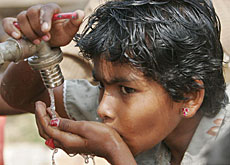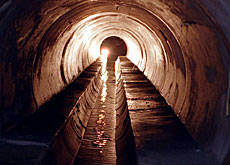Bright idea offers hope for drinking water

Swiss researchers have developed a biosensor that lights up when it detects arsenic, and have successfully tested it in drinking water in Vietnam.
The award-winning breakthrough could improve the lives of millions worldwide who face serious health problems caused by drinking arsenic-contaminated water.
Arsenic can lead to chronic poisoning if ingested regularly in small doses and is an acute problem in Bangladesh and Vietnam. It is also present in drinking water in China, Argentina, Hungary, New Zealand and the United States.
Researchers at the Swiss Federal Institute of Aquatic Science and Technology have developed a biosensor that highlights levels of arsenic in water.
Biosensors detect a substance by combining a biological component with a physico-chemical detector component. They often use organisms which respond to toxic substances at a much lower level than humans to warn us of their presence.
Using genetically modified bacteria that light up on contact with arsenic, the biosensor makes it possible to identify contaminated drinking water.
Because the bio-illumination is proportional to the concentration of arsenic, a more brilliant light signals a higher presence of arsenic.
Field success
Using biosensors to determine the level of arsenic is not a new idea but this is the first time the technique has proven successful in the field.
According to researchers at the Swiss Federal Institute of Aquatic Science and Technology, “almost all the testing weaknesses lay in an area… that is not relevant for the evaluation of arsenic in drinking water”.
The samples analysed with the biosensor were taken from the Mekong Delta and the Red River Delta in Vietnam.
The research team also comprised experts from Hanoi University and Lausanne University.
In addition to their biosensor research, the researchers are trying to find ways of removing arsenic from the water supplies.
Demand
Fast, reliable and economical on-site tests are in great demand since gauging the distribution of arsenic is difficult. Even in groundwater arsenic levels can vary widely, from extremely toxic to virtually harmless.
Arsenic cannot be seen or tasted and enters drinking water supplies from deposits in the earth or from agricultural and industrial practices.
The first symptoms of poisoning are cuts and scars on the skin, leading to respiratory and cardio-vascular problems before finally resulting in various forms of cancer.
At present, there is no specific treatment for arsenic poisoning. During its early stages, it can disappear if one simply refrains from drinking contaminated water. Proteins and certain vitamins can also help the body fight against it.
Because the undernourished are more susceptible to its effects, arsenic poisoning hits the poor the hardest.
swissinfo, Antoinette Schwab
(Adapted from German by Kathleen Peters)
Arsenic occurs naturally in rocks and soil and is worldwide one of the most frequently found inorganic harmful substances in groundwater.
Arsenic can enter drinking water through the ground or as runoff into surface water sources.
In higher doses it may lead to death, in lower doses to chronic poisoning.
High concentrations of arsenic in drinking water are an especially acute problem in Bangladesh, Vietnam and West Bengal (India).
In Bangladesh more than 50 million people drink groundwater with arsenic concentrations above the World Health Organization’s standard of 50 parts per billion.
Researchers at the Swiss Federal Institute of Aquatic Science and Technology have developed a biosensor that highlights levels of arsenic in water.
The journal Environmental Science and Technology awarded the team a prize for the best publication of 2005. Financing for the research was provided by the Swiss Agency for Development and Cooperation.

In compliance with the JTI standards
More: SWI swissinfo.ch certified by the Journalism Trust Initiative










You can find an overview of ongoing debates with our journalists here . Please join us!
If you want to start a conversation about a topic raised in this article or want to report factual errors, email us at english@swissinfo.ch.